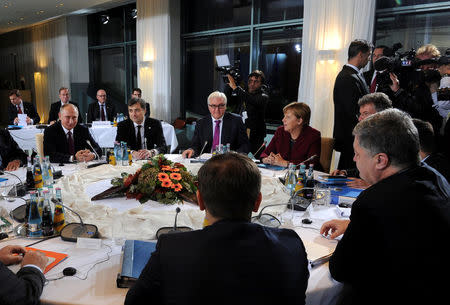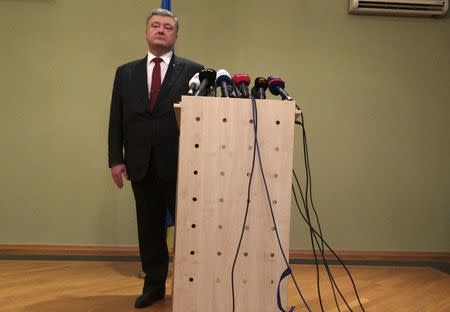Ukraine, Russia agree to more troop withdrawals, work on road map to peace
By Natalia Zinets and Andreas Rinke BERLIN (Reuters) - Ukraine, Germany, France and Russia agreed to draw up a road map in November on how to implement a stalled ceasefire deal for eastern Ukraine, Ukrainian President Petro Poroshenko said after five hours of talks among the leaders of the four countries. The sides also agreed to withdrawals of Ukrainian troops and Russian-backed separatists from four new areas at the frontline of the fighting in the Donbass region, he said after the first meeting of the "Normandy Format" leaders in over a year. They also agreed that monitors from the Organization for Security and Co-operation in Europe (OSCE) could be armed and that their activities in monitoring the so-called Minsk peace process would not be impeded. "There is no alternative to the Normandy Format," Poroshenko said. "This roadmap should have the sequence of the implementation of the Minsk agreements and guarantee their implementation." Separatist violence erupted in eastern Ukraine in 2014 and has killed 9,600 people so far. It continues despite a ceasefire made in the Belarussian capital Minsk last year. Both Russia and Ukraine accuse each other of perpetuating the violence. The meeting took place against the backdrop of heightened tensions between Russia and the West about Moscow's military support for Syria, and news that Russian warships off the coast of Norway were preparing to reinforce a brutal assault on the besieged Syrian city of Aleppo. Local elections remained a matter of debate, with Ukraine insisting it would only hold elections in the Donbass region after foreign forces withdrew, Poroshenko told reporters. After the Ukraine meeting ended, German Chancellor Angela Merkel and French President Francois Hollande met separately with Russian President Vladimir Putin to voice their concerns about Russia's support of Syrian President Bashar al-Assad. Merkel and Hollande will fly to Brussels on Thursday, where the European Union is due to debate its relations with Russia. "It was always clear to the chancellor and the German government that if such a (Ukraine) meeting occurred, that there would have to be discussion about Syria," Merkel's spokesman Steffen Seibert told reporters earlier Wednesday. "We have a catastrophic situation there. Don't expect more from the meeting today than these conditions and an assessment of who is responsible will be clearly named." Officials had sought to lower expectations in the run-up to the Ukraine talks, saying their main aim was to carry out a candid assessment of the situation and identify obstacles to implementing the Minsk peace deal for Ukraine. A ceasefire agreed by the four countries in the Belarussian capital Minsk in February 2015 stemmed heavy fighting between Ukrainian troops and Russian-backed rebels, but violence routinely flares along a demarcation line. Merkel, Hollande and Poroshenko met at the German chancellery separately before Putin's arrival and the start of the formal four-way talks, where they were joined by the foreign ministers and experts of all four countries. (Reporting by Natalia Zinets, Denis Pinchuk, Andreas Rinke, Andrea Shalal and Paul Carrel in Berlin, and Maria Tsvetkova in Moscow; Editing by Mark Heinrich and Lisa Shumaker)


